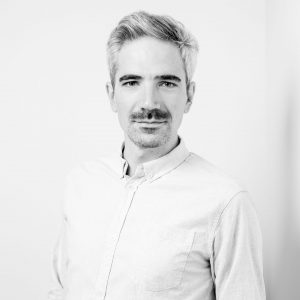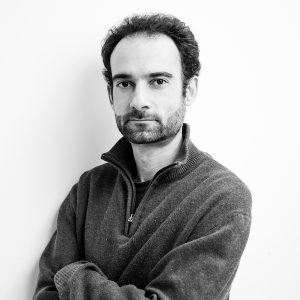Three SCIoI researchers take a look at the clusters’s ethical and philosophical side
SCIoI studies intelligence from the points of view of its various disciplines: We study the collective behavior of schools of fish or flocks of starlings and apply our findings to small robots that move synchronously. We observe mice and cockatoos as they open lockboxes or get out of escape rooms, and apply these mechanisms to artificial agents to make machines that are able to make efficient decisions. This research is affected by and affects ethical, philosophical and sociological questions, but how these questions come into play and how researchers can acknowledge them is not always evident. This is why the cluster has a dedicated research unit, known as Research Unit 4, that addresses these issues systematically and in close interaction with other projects at SCIoI. To better understand what this is all about, we’ve had a chat with three of our researchers involved in three different projects of Research Unit 4, Dafna Burema, Dimitri Coelho Mollo, and Tobias Drewlani. Here’s what they said.
- Dafna Burema
- Tobias Drewlani
- Dimitri Coelho Mollo
Why is it important to have social scientists, philosophers, and ethicists in the cluster?
Tobias Drewlani: SCIoI research raises very profound sociological, ethical, and philosophical questions that are concrete and tangible. For example, how do we need to rethink the established borders of the different disciplines? What are the possible future applications of the technologies developed at SCIoI? How can we speak about an idea as fundamental as intelligence? The way these questions should be approached is not always so evident or trivial, especially in the context of basic research. The responsibility of Research Unit 4 at SCIoI is to facilitate a systematic engagement with these questions in cooperation with other researchers and close to where those concerns arise, such as in the labs and research teams. So on the one hand, we act as interfaces within SCIoI providing the scientists with practical tools and methods necessary to engage with wider ethical and philosophical considerations. On the other hand, we make these sociological, ethical, and philosophical questions more precise and actionable through understanding how they unfold in the practice of science and observing the theoretical and concrete impact they have on science and society.
How are your projects related?
Dafna Burema: The way I see it, all projects in research unit 4 involve making the implicit explicit. For instance, I think everyone has implicit understandings of what intelligence is and what is or is not ethical. Similarly, researchers at SCIoI engage with interdisciplinarity on a daily basis. Projects in Research Unit 4 look at these taken-for-granted activities and perceptions of ethics, research methods, and definition of intelligence, and try to make them explicit from either a philosophical or sociological point of view.
How does SCIoI contribute to the “ethics in AI” debate in industry and academia?
Dafna Burema: SCIoI participates in the etami (ethical and trustworthy artificial and machine intelligence) consortium, where various industry and academic partners such as Volkswagen Group, KU Leuven, Atos, Continental, and Zalando come together to discuss AI ethics and ultimately create a “guidebook for ethical AI.” This is done on various topics. For instance, some activities within the consortium focus on creating auditing procedures to ensure the development of ethical AI, whereas other activities look at ways to ensure ethically sound documentation practices to increase transparency within the machine learning community. Currently, SCIoI is leading a project within etami that analyzes incidents with AI. The goal is to understand the context of such incidents by asking questions like, what happened? Where did it occur? What can we learn from this?
How can we overcome the fragmented nature of intelligence research?
Dimitri Coelho Mollo: I think that there are many things that we can do. The first and most important one is to try and improve the dialogue between the different areas of science interested in intelligence, especially cognitive psychology, animal cognition research, and AI. One of the roles of philosophy is to look for links between different fields, taking a sort of bird’s eye view of what is going on in a broader domain of science. So philosophy becomes very relevant here.
A concrete example: philosophy can try to find a characterisation of intelligence at a level that allows people studying human intelligence, people studying non-human intelligence, and people trying to build AI to see what there their fields have in common, how some difficulties and puzzles are shared between these seemingly different phenomena, and what kinds of insights they can take from other fields to apply to their own. Doing that is the core aim of my project at SCIoI.
Achieving interdisciplinarity is one of SCIoI’s goals, but it has its challenges: How can the Cluster succeed in this, and what are the main questions?
Tobias Drewlani: SCIoI aims for a far-reaching interdisciplinary research practice where disciplines come together to create a unified vision of intelligence. In order to make this happen, SCIoI researchers need to develop a shared language between their disciplinary understandings and findings.
SCIoI’s unique approach is to use synthetic (i.e. artificial) artifacts to explore animal behavior, and to learn from animal behavior to create intelligent behavior in synthetic artifacts. However, “translations” between analytical and synthetic disciplines often prove to be particularly challenging. For instance, can the idea of “collective learning” be understood in the same way in behavioral biology and swarm robotics? Unfortunately, there is no script that can tell us exactly how to approach these challenges, but it is possible to collaboratively develop tools and methods that can help us navigate these situations. This is the point where my project comes into play. In my view, we can learn how to make sense of these interdisciplinary situations which are, by definition, always new and characterized by gaps. But this is what makes the context of SCIoI so interesting.
Science of Intelligence put forward a provisional definition of intelligence back in 2019. Is this definition evolving, or is it bound to evolve in the next few years?
Dimitri Coelho Mollo: I think that it is unlikely that anything like a definition of intelligence, in the strong sense, will be possible. If you think about it, we don’t have agreed-upon strict definitions for many scientific concepts, especially in the so-called special sciences (that is, sciences that are not fundamental physics, or math, if you think that mathematics is a science). What we do have are more or less justified, more or less explanatorily powerful, more or less abstract concepts, which are in continuous development and that vary in their fruitfulness depending on the use they are put to. I think that the provisional characterisation of intelligence provided by SCIoI is a good starting point, but it will naturally evolve in light of future philosophical and empirical work. In my project, we try to make some progress on this.
Photo by Gianmarco Zeh on Unsplash








